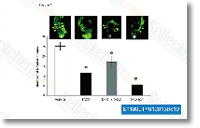So, the bacteria have to adapt to and survive during the new environ ment, Hale located that some temperature delicate Shigella spp. are capable of invading the intestinal epithelium only at elevated temperature and that invasion doesn’t occur at 37 C, Ellis reported that sure proteins are overexpressed in response to substantial temperature and serve as defense mechanisms against various environmental selleck chemicals stresses, Investigation has also proven that the HSPs are frequently re lated for the virulence with the pathogens, On this study, we compared the OMP expression profiles of S. flexneri cells grown at 37, 38. 5, and forty C to assess expression degree modifications in cells which might be induced by temperature maximize. These proteins that showed a professional minent enhance in expression at 38.
5 and 40 C were sub sequently identified utilizing MALDI ToF ToF analysis so that you can show the presence of HSPs. Materials and approaches Shigella strains as well as sereny check The four clinical strains of Shigella flexneri 2a used in this research were ob tained from your Division of Health-related Microbiology and Parasitology, Perifosine School of Medical Sciences, Universiti Sains Malaysia. Virulence of these isolates was checked by per forming Sereny check in order to determine their capacity to lead to keratoconjunctivitis in guinea pigs. This animal study was conducted in accordance with the necessities from the Animal Ethics Committee, Universiti Sains Malaysia approval protocol PPSG 07 044. The 4 S. flexneri strains have been tested by means of inoculation into guinea pig eyes as follows. The bacterial strains were grown overnight in LB broth.
They have been used to the test when they reached 108 CFU in normal saline, as determined by measuring  optical density at 600 nm. Each and every eye of the Hartley guinea pig was inoculated within the conjunctival sac with 108 CFU of one particular on the wild strains. Guinea pigs had been examined each day for 5 days, and their inflammatory responses had been graded in accordance to Hartman et al. Advancement with the illness was rated as follows.
optical density at 600 nm. Each and every eye of the Hartley guinea pig was inoculated within the conjunctival sac with 108 CFU of one particular on the wild strains. Guinea pigs had been examined each day for 5 days, and their inflammatory responses had been graded in accordance to Hartman et al. Advancement with the illness was rated as follows.
SiRNA Library
Mitosis is part of the cell cycle.
